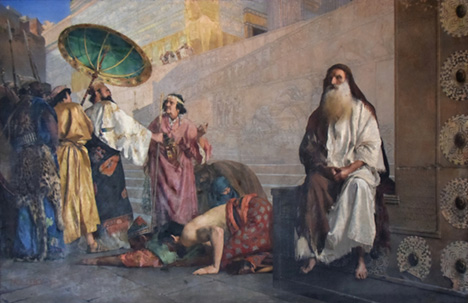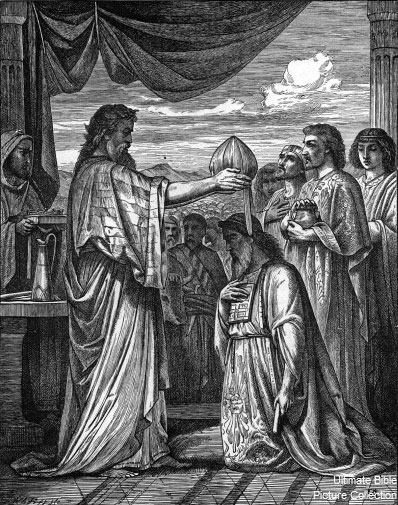Brexit and the Binding of Satan – Part 5

Satan is currently bound from gathering the nations in kingly rebellion so that Jesus might gather them in priestly unity.

Satan is currently bound from gathering the nations in kingly rebellion so that Jesus might gather them in priestly unity.
 James Jordan is continuing his commentary on Esther in the Biblical Horizons newsletter. As always, he makes some interesting observations on Haman’s “prospectus” speech to the king in Esther 3, in which he describes the Jewish people:
James Jordan is continuing his commentary on Esther in the Biblical Horizons newsletter. As always, he makes some interesting observations on Haman’s “prospectus” speech to the king in Esther 3, in which he describes the Jewish people:
The first thing to notice is that what Haman says is correct. The Jews do have different laws and customs. The word here is dat, which is a general word for laws and customs and mores. This much is quite true, and has been no problem in the Persian empire.
Of course, God’s new golden-haired boy got things wrong, as all Adams do when given the opportunity of glorious kingdom. The metal man in his dream (the new “empire-Tabernacle”) only had gold at the head, but King Nebuchadnezzar’s obelisk was gold from head to foot. This new king, under whom Israel was now a “Covenant vassal,” would be taught by God that he, too, was subject to a higher authority.
Doug Wilson recently made a distinction between what usually passes for hypocrisy in Christian circles, and the kind practiced openly by the self-righteous:
One of my central pastoral responsibilities is that of keeping Christians away from hypocrisy, of the kind described in the New Testament. But this task, not surprisingly, is often misunderstood — and the reason it is misunderstood is that there are always lots of people who don’t want to be kept out of that kind of hypocrisy, and misdirection is that name of the game.
Some more thoughts on New Covenant Virility.
The minute details of the Bible matter. What was the Ethiopian eunuch, keeper of the queen’s treasure, reading, and why? In sacred history there are no accidents.
Isaiah 53 is about the barrenness and woundedness of God’s Man. He is circumcision epitomised. Like a eunuch, He is judged by men as unfit for Tabernacle service, judged in the gates (kingdom doors shut) and sent outside the city. He is “stricken,” or afflicted with stroke, God’s “lash” of plague, as unacceptable-for-priesthood as a leper.
“…and who will declare His generation?” Here is an important detail. What does this mean?
Most commentators, including N. T. Wright, get the Restoration era all wrong. Our history as God’s people is cruciform, which is reflected in the four faces of the cherubim. The Mosaic “bull face” (the Bronze Altar) was replaced with the Davidic “lion face” (the Ark). The Ark was taken by God, and the era of the prophets began, the “eagle face” (the all-seeing Lampstand). Resurrected Israel was to be wise men to Gentile kings, leaven within the kingdoms shown to Nebuchadnezzar. They would not have a Jewish king until the fourth face, the Man, arrived (the Table of Showbread).
“…if the Lord creates something new, and the ground opens its mouth and swallows them up with all that belongs to them, and they go down alive into Sheol, then you shall know that these men have despised the Lord.” (Numbers 16:29-30)
Daughter Jerusalem kept up an outward show of respectability, but under her Temple veils and military skirts her legs were open for anyone. [1] In a vision, Ezekiel dug a hole through this wall of “whitewash” as a legal witness to her crimes against the Covenant.
Daniel was taken to Babylon before the destruction of Jerusalem. As the ruler over the king’s advisors, it is highly likely he was involved in the razing of Jerusalem.
The Lord sent Joseph into Egypt as a forerunner, established his house and integrated the old house of Jacob into it. Pharaoh was converted under the ministry of Joseph, humbled himself before Jacob and requested a blessing.
The Lord did the same thing with Daniel. A new house was being established in Babylon before the final demolition of the old Temple. Daniel ascended as “firstfruits”. He stood on the mountain of God as Abraham, as Moses. At the right hand of the power he would bring the curses of the Law raining down upon the Covenant breakers. As Abraham bargained with God, perhaps the mercy shown to Judah’s poor was the work of Daniel.
But the LORD said to Joshua, “Do not be afraid because of them, for tomorrow about this time I will deliver all of them slain before Israel. You shall hamstring their horses and burn their chariots with fire.” Joshua 11:6
‘Thus says the Lord GOD: “Are [you] he of whom I have spoken in former days by My servants the prophets of Israel, who prophesied for years in those days that I would bring you against them? Ezekiel 38:17
James Jordan’s correlation of Ezekiel 38-39 with the book of Esther makes a great deal of sense.[1] I have found it plays out in many ways, including the structure of the book of Ezekiel. None of the books of the Bible are thrown together haphazardly. They all follow strict literary conventions. The validity of this Esther interpretation is supported by the structure of the book of Ezekiel.

In Through New Eyes, James Jordan notes that the wilderness was Havilah, the place mentioned in Genesis 2 that was rich in raw materials. Israel stripped Egypt of her gold, then plundered the desolate places of hidden wealth. She came out of the desert with a High Priest clothed in gems, and a new generation of soldiers born of God’s threshing floor.
The manna began to fall just after the Hebrews’ victory over Pharaoh. As with Jacob, the Lord was faithful to provide for His chosen one. But perhaps, in covering the ground, there is also the idea of a firmament (this might sound strange to some readers, but I have found the concept is a frequent one). The wilderness is the place of the humble bread of priesthood, displayed in obedience to God. It was the next generation that would drink the wine of Canaan after obedience under Joshua.
The Lord commanded that some manna be put into the Ark as a memorial. Symbolising manna, the white stone is a memorial of faithful priesthood. Joshua’s crossing of the Jordan was memorialised by large, engraved, white stones.